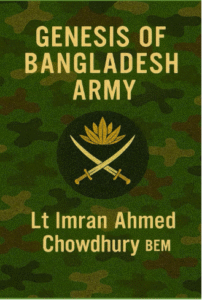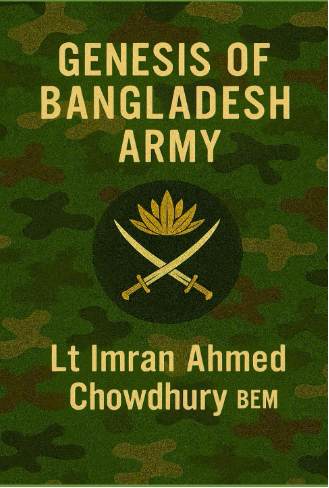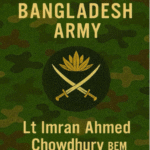By Lt Imran Chowdhury BEM
1. The Constitutional Chain Around Soldiers’ Necks
Few citizens of Bangladesh realise that the very Constitution born out of the people’s blood in 1971 contains a silent clause that allows the state to repress those who wear its uniform.
That clause — Article 45 — reads like a benign safeguard for discipline, but in reality, it has become a constitutional licence for victimisation.
“Nothing in this Part shall apply to any provision of a disciplinary law relating to members of a disciplined force, being a provision limited to the purpose of ensuring the proper discharge of their duties or the maintenance of discipline in that force.”
— Article 45, Constitution of the People’s Republic of Bangladesh
In plain terms, it says that the Fundamental Rights guaranteed to every Bangladeshi — equality before law, protection of law, due process — do not apply to members of the armed forces when it comes to disciplinary law.
This one article created a constitutional black hole where soldiers’ human rights disappear. A major, captain, or sepoy can be dismissed, imprisoned, or ruined without the right to challenge it in any civilian court — because, under Article 102(5), the High Court cannot issue writs against any tribunal or court created under “a law relating to the defence services.”
Together, these two clauses forged an iron curtain of legal impunity around the military establishment — a curtain that generals and dictators have repeatedly pulled down to hide injustice, corruption, and political manipulation inside the barracks.
2. The Legal Fortress: Army Act 1952
The Bangladesh Army Act 1952, a colonial-era relic inherited from Pakistan, provides the machinery for this suppression.
Section 1 gives the authorities sweeping power to “dismiss, remove, or retire” personnel under its provisions.
No independent tribunal.
No civilian oversight.
No right of appeal to the Supreme Court.
The entire mechanism remains internally controlled by the same hierarchy that initiates the punishment.
A system where the accuser, investigator, and judge often wear the same uniform.
This setup might have served the rigid discipline of the Pakistan Army, but in a people’s republic born from rebellion, it stands as a contradiction to the very ideals of freedom for which thousands of soldiers and officers died in 1971.
3. The Repatriated Nexus: When the Foxes Returned to Guard the Coop
After independence, the return of repatriated Pakistani-trained officers drastically altered the ethos of the Bangladesh Army.
Many of these officers — trained in West Pakistan’s cantonments and steeped in that army’s authoritarian culture — came back to a liberated country but never liberated themselves from the colonial mindset.
They quickly aligned with right-wing and Islamist sentiments, looking down upon the freedom-fighter officers who had fought shoulder to shoulder with the Mukti Bahini.
Using the constitutional loopholes of Article 45 and the Army Act, these repatriated elites began a silent cleansing of the institution:
officers who were too independent, secular, or pro-people were branded as “indisciplined” or “politically unreliable” and removed through so-called administrative actions.
The Constitution gave them cover; the courts gave them silence.
4. The Cadet College Clique and the New Aristocracy
The rise of Cadet College-educated officers further entrenched elitism. These young men, groomed in colonial-style discipline, entered the Army believing themselves the natural heirs to command. Their loyalty was rarely to democratic institutions — rather to the uniform, the hierarchy, and at times, to whichever regime favoured them.
They mastered the art of using Article 45’s “discipline clause” to eliminate dissenting peers.
Once an officer fell out of favour — whether for questioning corruption, refusing unlawful orders, or simply belonging to the “wrong batch” — he could be labelled “unfit,” “disloyal,” or “of questionable integrity.”
The administrative order of dismissal required no public hearing, no judicial review, and no accountability.
Thus, a class system grew within the Army:
-
The Repatriates, nostalgic for Pakistan’s order;
-
The Cadet College elite, craving power and privilege;
-
and a shrinking minority of secular freedom-fighter officers, who were gradually marginalised or forced out.
5. When Law Becomes a Weapon, Not a Shield
The original intent of Article 45 — to preserve discipline — has long been lost.
It is now weaponised to crush conscience and independence.
During Bangladesh’s numerous authoritarian regimes — from General Ziaur Rahman to H.M. Ershad, and through the semi-civilian governments that courted the military — the “discipline exemption” allowed rulers to purge the Army without facing legal consequences.
Under martial-law ordinances, officers were removed en masse; some for imagined coup plots, others for political inconvenience.
No one could seek redress because the Constitution itself denied them that right.
This legal stranglehold has created a culture of fearful obedience rather than professional discipline — an army where loyalty to a person outweighs loyalty to the Constitution.
6. Judicial Paralysis by Design
When aggrieved officers sought justice, they found the courthouse doors locked.
Article 102(5) explicitly states that the High Court cannot entertain writs against defence-service tribunals.
The precedent set in Bangladesh vs Md Abdus Satter & Others cemented this exclusion: the Appellate Division confirmed that military tribunals and administrative actions within disciplined forces fall outside the purview of judicial review.
Thus, the judiciary — the last refuge of citizens — became constitutionally disarmed.
This is not just a legal technicality; it’s a human-rights tragedy.
For soldiers and officers, there is no habeas corpus, no mandamus, no certiorari — only silence and submission.
7. The Dictators’ Paradise
With these legal protections, military dictators found paradise.
They could dismiss, promote, or imprison at will — and the Constitution would back them up.
General Zia used it to remove freedom-fighter officers whom he saw as political liabilities.
General Ershad used it to build a network of loyalists by rewarding obedience and punishing dissent.
Even in democratic times, successive governments exploited these clauses to tame the Army or to buy its loyalty through promotions, contracts, and immunity.
It created a system where dictatorial control masqueraded as constitutional discipline.
8. The Human Cost: Broken Lives and Silent Suffering
Behind every “administrative dismissal” is a human story of humiliation.
An officer branded disloyal loses not just his commission but his identity, pension, and social dignity.
Many descend into depression; families disintegrate; children suffer the stigma of being “the dismissed officer’s son.”
The Constitution, which should have been their protector, becomes their prosecutor.
For decades, hundreds of officers and soldiers have fallen victim to this invisible war — not on the battlefield, but in offices lined with files stamped “CONFIDENTIAL – Dismissal under Army Act.”
9. When Faith Replaces Professionalism
As secular and professional voices were suppressed, religious and ideological extremism found space.
Officers aligned with pro-Islamist and right-wing nationalist agendas gained influence.
The same legal impunity that silenced reformers emboldened ideologues.
Gradually, whispers of the “Islamisation of the Army” turned real — mosques and madrasa-inspired cells flourished within cantonments, replacing the secular ethos of the Liberation War with sectarian loyalty.
When ideology creeps into an army, discipline no longer serves the nation — it serves dogma.
And yet, Article 45 still shields these manipulators, because all their actions are justified under the pretext of maintaining discipline.
10. The Psychological Erosion of the Institution
An army thrives on trust — trust between ranks, between command and subordinates, and between the military and the state.
When officers know that the Constitution itself denies them the right to justice, that trust erodes.
You cannot build a patriotic, professional force on fear.
Today’s disharmony, factionalism, and low morale within the Bangladesh Army are not accidental; they are the direct by-products of this constitutional design.
The younger generation of officers — born long after 1971 — see no heroes left, only bureaucratic generals and political appointees.
They serve without a voice, and they fear without hope.
11. The 1971 Irony: From Freedom to Fear
The ultimate irony is unbearable.
The very force that birthed from the revolt of the East Pakistan Rifles and Bengali officers in 1971 against West Pakistani tyranny is now bound by the same chains its forefathers broke.
Back then, Bengalis in uniform revolted because they were denied justice, equality, and dignity.
Today, Article 45 and its legal descendants replicate that same denial — only this time under the flag of independent Bangladesh.
The Constitution, instead of protecting those who guard it, has institutionalised their vulnerability.
12. The Way Forward: Reform or Ruin
If Bangladesh aspires to be a modern democracy, it must confront this moral and legal contradiction.
Reforming Article 45 and Article 102(5) does not mean weakening the armed forces — it means strengthening their integrity.
Proposed reforms could include:
-
Allowing limited judicial review in cases of manifest injustice or violation of natural justice.
-
Establishing an independent Military Ombudsman answerable to Parliament, not to the Army HQ.
-
Replacing colonial-era disciplinary clauses with modern due-process safeguards.
-
Ensuring that every officer dismissed administratively has the right to a fair hearing and legal counsel.
-
Codifying a “Bill of Rights for Armed Forces Personnel,” protecting dignity, family security, and access to justice.
Until such reforms occur, the Bangladesh Army will remain a disciplined force but not a just one.
13. Lessons from Abroad
Modern democracies have evolved.
In the UK, India, and Canada, courts can review military disciplinary actions if they breach natural justice or constitutional guarantees.
Even Pakistan — ironically — has begun limited oversight through its Federal Service Tribunal.
Bangladesh alone clings to a 1950s military-law mindset that treats soldiers as property of the state, not citizens of a republic.
The world’s armies are professionalising; Bangladesh’s is fossilising.
14. From Discipline to Despotism
Every dictatorship begins by redefining discipline as obedience and obedience as patriotism.
Once that cycle begins, dissent becomes mutiny, conscience becomes crime, and law becomes tyranny.
The Bangladesh Army’s constitutional insulation has allowed precisely that evolution.
It turned the noble profession of arms into a hierarchy of fear — where officers are taught to salute power, not principle.
Generals who once vowed to defend the Constitution have used it as a shield for their own misdeeds.
15. Reclaiming the Spirit of 1971
Reforming these unjust provisions is not merely a legal necessity; it’s a moral duty to the martyrs of 1971.
They fought to create a nation where every citizen — in uniform or not—would enjoy equality before the law.
It’s time to honour that promise.
The next generation of officers deserves a Bangladesh where discipline coexists with dignity, and loyalty does not demand silence.
The Army’s honour will not be restored by fear or religious rhetoric — only by justice.
16. Final Thoughts
The story of Article 45 is the story of how a Constitution meant to liberate became an instrument of subjugation.
It tells of an Army that lost its moral compass to legal immunity, of officers who traded courage for careerism, and of a nation that forgot the price of freedom.
Unless these constitutional shackles are broken, the Bangladesh Army will continue to live in the shadow of its own ghosts — repatriates, dictators, and demagogues — who found in Article 45 the perfect refuge for tyranny.

Tags / Keywords
#BangladeshArmy #Article45 #HumanRights #MilitaryJustice #ConstitutionalReform #Bangladesh1971 #JusticeForSoldiers #FreedomAndDiscipline #ImranChowdhuryBEM


